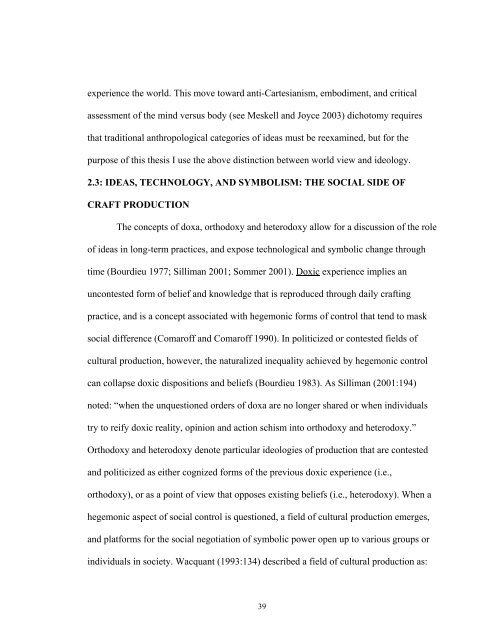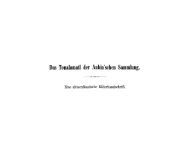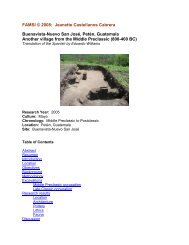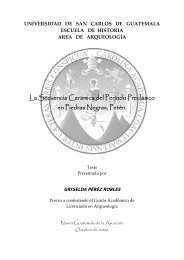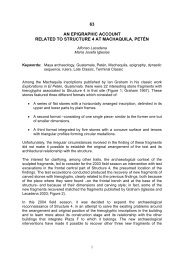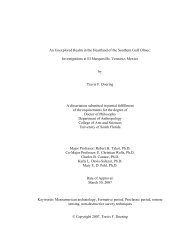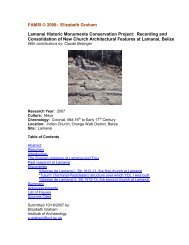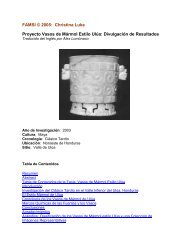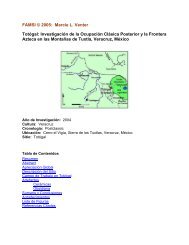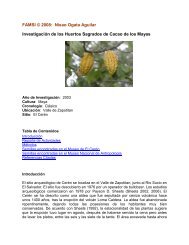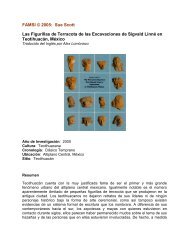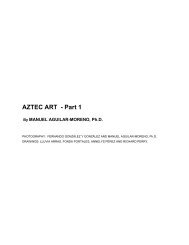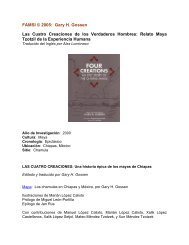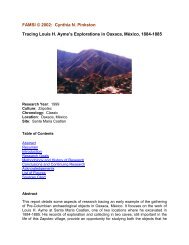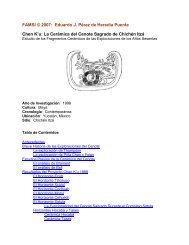- Page 1 and 2:
UNIVERSITY OF CALIFORNIA RIVERSIDE
- Page 4 and 5: Acknowledgements Foremost, I thank
- Page 6 and 7: ABSTRACT OF THE DISSERTATION The Or
- Page 8 and 9: TABLE OF CONTENTS LIST OF FIGURES
- Page 10 and 11: 5.4.1.1.5: Large laurel leaf biface
- Page 12 and 13: 7.2.1: Hypothesis 1……………
- Page 14 and 15: 6.2: Examples of possible pressure-
- Page 16 and 17: LIST OF TABLES Chapter 4: Lithic Re
- Page 18 and 19: the royal palace had more access to
- Page 20 and 21: argued that most studies intended t
- Page 22 and 23: The research presented here submits
- Page 24 and 25: flakes of microcrystalline quartz,
- Page 26 and 27: whereby data were recorded. The hyp
- Page 28 and 29: ecause the debate actually concerns
- Page 30 and 31: “technological-resource realm”
- Page 32 and 33: and another chert production locale
- Page 34 and 35: activities may in turn have given r
- Page 36 and 37: Most of these studies are somewhat
- Page 38 and 39: consequence of this perspective is
- Page 40 and 41: study is but one more building bloc
- Page 42 and 43: avoids the problem of how to charac
- Page 44 and 45: and probably did, have multiple occ
- Page 46 and 47: for them, but also the status of wh
- Page 48 and 49: which represents nondiscursive prac
- Page 50 and 51: ideology, hegemony, and similar con
- Page 52 and 53: can overlap through religious and s
- Page 56 and 57: [A] relatively autonomous and struc
- Page 58 and 59: materialize” (2000:140; my emphas
- Page 60 and 61: itualized production should not be
- Page 62 and 63: commonplace (cf. Childs 1998). Ritu
- Page 64 and 65: [R]ituals employed during manufactu
- Page 66 and 67: Another Aztec example indicates tha
- Page 68 and 69: period documents, charters other fo
- Page 70 and 71: Although this passage describes a s
- Page 72 and 73: materials, such as the central Pet
- Page 74 and 75: emergent craft ideologies, and an o
- Page 76 and 77: not to say that production, even ri
- Page 78 and 79: Pennsylvania that yielded an import
- Page 80 and 81: information from new excavations is
- Page 82 and 83: interpretation, are mentioned on Ea
- Page 84 and 85: e interpreted as being structurally
- Page 86 and 87: of his father, if we can consider t
- Page 88 and 89: Figure 3.1: Teotihuacan-style mount
- Page 90 and 91: Figure 3.3: Column altar Cache R-5-
- Page 92 and 93: the city. Since the ceramic chronol
- Page 94 and 95: some residential groups feature mor
- Page 96 and 97: from the seat of power by many diff
- Page 98 and 99: microcrystalline quartzes were rese
- Page 100 and 101: eceived these scores from moderate
- Page 102 and 103: Figure 3.4: Two examples of hammers
- Page 104 and 105:
used, they probably had a lesser ex
- Page 106 and 107:
typology chapters of this study, bu
- Page 108 and 109:
degree to which lithic production w
- Page 110 and 111:
Furthermore, general patterns of pr
- Page 112 and 113:
previously (see Chapter 5). A typol
- Page 114 and 115:
and between nodules, which were sel
- Page 116 and 117:
of these materials are nodular flin
- Page 118 and 119:
eduction flakes found at the site (
- Page 120 and 121:
104
- Page 122 and 123:
Table 4.1 depicts the percentages b
- Page 124 and 125:
Table 4.2 depicts microcrystalline-
- Page 126 and 127:
from Ixtepeque, the opaque black co
- Page 128 and 129:
Table 4.3: Counts and percentages o
- Page 130 and 131:
Table 4.4: The total counts and wei
- Page 132 and 133:
Table 4.5 continued. 116
- Page 134 and 135:
Table 4.5 continued. 118
- Page 136 and 137:
Table 4.5 continued. 120
- Page 138 and 139:
122
- Page 140 and 141:
According to the three spatial grou
- Page 142 and 143:
4.2.2: Color and Quality of El Chay
- Page 144 and 145:
128
- Page 146 and 147:
quartz eccentrics from the two site
- Page 148 and 149:
systematic sourcing program for mic
- Page 150 and 151:
technological typology that focuses
- Page 152 and 153:
establishing chronologies, and also
- Page 154 and 155:
Aside from these speculative accoun
- Page 156 and 157:
combination of morphological and te
- Page 158 and 159:
Shafer and Hester (1983) also creat
- Page 160 and 161:
(in Rovner and Lewenstein 1997:23),
- Page 162 and 163:
primary technological trait, such a
- Page 164 and 165:
#1-Large Celt Biface, Thin Kidder 1
- Page 166 and 167:
#7-Large, Stemmed Biface Hester 198
- Page 168 and 169:
#20-Medium Circular Biface Rectangu
- Page 170 and 171:
#30-Small Stemmed Biface Ricketson
- Page 172 and 173:
typological variation also may stem
- Page 174 and 175:
This form is thoroughly described i
- Page 176 and 177:
Figure 5.3.2: Examples of thick cel
- Page 178 and 179:
Figure 5.4: A celtiform-biface frag
- Page 180 and 181:
describes the technology and morpho
- Page 182 and 183:
The working bit is produced by a si
- Page 184 and 185:
5.4.1.1.7: Large stemmed biface (se
- Page 186 and 187:
5.4.1.2: Medium-sized artifacts (8
- Page 188 and 189:
ased on proximal or medial fragment
- Page 190 and 191:
Figure 5.7: Medium-sized oval unifa
- Page 192 and 193:
medium-sized, laurel leaf unifaces
- Page 194 and 195:
leaf bifaces, which also can be par
- Page 196 and 197:
surface of a nodule reduction flake
- Page 198 and 199:
in some cases, be thoroughly chippe
- Page 200 and 201:
core such as is used in the Middle
- Page 202 and 203:
The small stemmed biface type also
- Page 204 and 205:
domestic archaeological record at P
- Page 206 and 207:
and northern Belize regions. During
- Page 208 and 209:
Figure 5.9: Microcrystalline-quartz
- Page 210 and 211:
Figure 5.10: Unifacially-worked lau
- Page 212 and 213:
they had the same meaning and value
- Page 214 and 215:
At Piedras Negras biface-reduction
- Page 216 and 217:
The goal of reduction would be to p
- Page 218 and 219:
5.6.3: Notching Flakes: Indirect Pe
- Page 220 and 221:
Figure 5.13: Evidence for the reduc
- Page 222 and 223:
5.6.7: Resharpening, Rejuvenation,
- Page 224 and 225:
CHAPTER 6 TYPOLOGY OF OBSIDIAN ARTI
- Page 226 and 227:
Figure 6.1: Exhausted obsidian blad
- Page 228 and 229:
Exhausted cylindrical cores are fou
- Page 230 and 231:
Figure 6.2: Examples of possible pr
- Page 232 and 233:
216
- Page 234 and 235:
face of the core. Clark and Bryant
- Page 236 and 237:
Figure 6.5: Percussion flakes remov
- Page 238 and 239:
Figure 6.7: Distal rejuvenation bla
- Page 240 and 241:
section, and then were prepared and
- Page 242 and 243:
Figure 6.9: Obsidian eccentrics tha
- Page 244 and 245:
Figure 6.11: Second-series pressure
- Page 246 and 247:
lade-core platforms at Piedras Negr
- Page 248 and 249:
Figure 6.13.1: Platform rejuvenatio
- Page 250 and 251:
termination was used as a platform
- Page 252 and 253:
Figure 6.16: Crested blade from Pie
- Page 254 and 255:
Figure 6.18: Distal rejuvenation fl
- Page 256 and 257:
this technique is on transforming t
- Page 258 and 259:
6.3.2: Some Implications of Single-
- Page 260 and 261:
differentiation in others. This is
- Page 262 and 263:
Figure 6.22: Cores notched by press
- Page 264 and 265:
Figure 6.24: Completely-bifaced fla
- Page 266 and 267:
specific types of debitage, only re
- Page 268 and 269:
for cylindrical cores. The edges of
- Page 270 and 271:
The debitage from the production of
- Page 272 and 273:
is understood to be the site core.
- Page 274 and 275:
Figure 7.2: Map of the acropolis at
- Page 276 and 277:
Figure 7.3: Map of Piedras Negras d
- Page 278 and 279:
inhabited up to the Kumche phase, a
- Page 280 and 281:
264
- Page 282 and 283:
area of the city. PN23 also appears
- Page 284 and 285:
The third and final spatial groupin
- Page 286 and 287:
270
- Page 288 and 289:
historical connection to previous i
- Page 290 and 291:
any other residential group at Pied
- Page 292 and 293:
Phase Cutting Edge to Mass Ratio Av
- Page 294 and 295:
An analysis of CE:M ratios and blad
- Page 296 and 297:
Site Op Phase Artifact Type Modific
- Page 298 and 299:
number of different ways. According
- Page 300 and 301:
It is true, however, that the major
- Page 302 and 303:
Site Operation Phase Area Non- prod
- Page 304 and 305:
Obsidian-Eccentric Types Yaxche Cha
- Page 306 and 307:
obsidian eccentrics, a likely scena
- Page 308 and 309:
debitage had a symbolic and economi
- Page 310 and 311:
anywhere from one to twenty years a
- Page 312 and 313:
Figure 7.11: Column altar Cache R-5
- Page 314 and 315:
etween the two samples of obsidian
- Page 316 and 317:
indicates they may have been associ
- Page 318 and 319:
Figure 7.15: Obsidian eccentrics in
- Page 320 and 321:
304
- Page 322 and 323:
although in a diminished quantity,
- Page 324 and 325:
anthropomorphized or characterized
- Page 326 and 327:
circumscribed, especially consideri
- Page 328 and 329:
Figures 7.20: Obsidian biface eccen
- Page 330 and 331:
as a potpourri of symbols and reduc
- Page 332 and 333:
continued, although in a minor way
- Page 334 and 335:
Figure 7.24: Refit of flake and bif
- Page 336 and 337:
tomb (Burial 10) and the tomb of Ru
- Page 338 and 339:
ut some of them (N=34) were late-st
- Page 340 and 341:
8.1: SUMMARY OF TEST RESULTS CHAPTE
- Page 342 and 343:
obsidian technologies differed from
- Page 344 and 345:
organization at the end of the Yaxc
- Page 346 and 347:
The symbolic nature of chipped-ston
- Page 348 and 349:
previously unrecognized patterns of
- Page 350 and 351:
conversion of symbolic capital may
- Page 352 and 353:
cache name contains the name of the
- Page 354 and 355:
BIBLIOGRAPHY Aldenderfer, Mark S. 1
- Page 356 and 357:
Child, Mark B. 1997 PN 18: Excavaci
- Page 358 and 359:
Comaroff, Jean, and John Comaroff 1
- Page 360 and 361:
Fedick, Scott 1991 Chert Tool Produ
- Page 362 and 363:
Golden, Charles 1998 PN 11: Excavac
- Page 364 and 365:
1991 Maya Stone Tools: Selected Pap
- Page 366 and 367:
Hruby, Zachary X., Fred Nelson, and
- Page 368 and 369:
Kovacevich, Brigitte 2003 Ritual, C
- Page 370 and 371:
1992a Resources, Specialization, an
- Page 372 and 373:
Nelson, Fred W, Jr. 1988 Trace Elem
- Page 374 and 375:
Rands, Robert, and Ronald Bishop 19
- Page 376 and 377:
Scholes, France V. and Ralph L. Roy
- Page 378 and 379:
Spielmann, Katherine A. 1998 Ritual
- Page 380 and 381:
Tozzer, Alfred M. 1941 Landa’s Re


